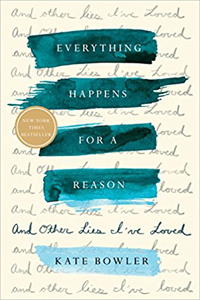 Kate Bowler, Everything Happens for a Reason: And Other Lies I've Loved (New York: Random House, 2018), 178pp.
Kate Bowler, Everything Happens for a Reason: And Other Lies I've Loved (New York: Random House, 2018), 178pp.
Two years ago the New York Times published an opinion piece by Kate Bowler, a historian at Duke Divinity School, called "Death, the Prosperity Gospel, and Me" (February 13, 2016). A few months before she wrote the piece, Bowler was diagnosed with Stage IV colon cancer. She was thirty-five. That op-ed burned up the internet, and has now been expanded into a book.
It was a "massive tumor" and not a bad gallbladder that was causing her abdominal pain. After falling to her knees in tears, and crying in the arms of her husband, one of the first thoughts she had was also, "Oh, God, this is ironic." Why? Because she had recently published a book called "Blessed."
Bowler has specialized in the American prosperity gospel that promises us health, wealth, and happiness. For her book Blessed: A History of the American Prosperity Gospel (Oxford, 2013), she spent ten years interviewing megachurch pastors, watching televangelists, and listening to celebrities pray for people in wheelchairs. She joined 900 tourists on a trip to Israel with Benny Hinn. Raised on the prairies of Winnipeg, Bowler observes that even some of her own famously modest Canadian Mennonites have bought into the idea that the right kind of faith leads to blessings.
"Blessed" is the operative word, says Bowler, a shorthand for the prosperity gospel. As in "I am blessed." As in a #blessed hashtag at Thanksgiving. For many Christians, "being blessed" is the goal of the gospel. In Bowler's judgment, this gospel of prosperity and blessing has become "a full-fledged American phenomenon."
There's a good and proper sense of the word "blessed," she observes, as in a deep sense of gratitude for God's goodness. But among prosperity preachers, "blessed" is a reward for right faith. This narcissistic sense of "blessed" includes a palpable sense of entitlement and smugness, not to mention the shaming and blaming of others who exhibit faulty faith.
In other words, and as Oprah has said, there's no such thing as luck. And certainly not bad luck. Only a divine order for my good. A quid pro quo of God's blessings for my faith. "This is America," writes Bowler, "where there are no setbacks, just setups. Tragedies are simply tests of character." And so the title of her new book: the lie that we all love, that everything has a purpose.
According to the prosperity gospel, "everything happens for a reason." This is what one of Bowler's neighbors assured her after knocking on her door.
"I'd love to hear it," said Bowler's husband.
"Pardon?!" replied the surprised neighbor.
"I'd love to hear the reason my wife is dying."
The prosperity gospel tries to exert order over the chaos in our lives, to solve the mystery of human suffering, "because the opposite of #blessed is leaving a husband and a toddler behind, and people can't quite let themselves say it, 'Wow. That's awful.'"
And so the prosperity gospel "offers people a guarantee: Follow these rules, and God will reward you, heal you, restore you… The prosperity gospel holds to this illusion of control until the very end," and regardless of obvious evidence to the contrary.
In a passage from her op-ed that could have been written specifically for Palm Sunday and the passion of our Lord, Bowler writes:
"The prosperity gospel has taken a religion based on the contemplation of a dying man and stripped it of its call to surrender all. Perhaps worse, it has replaced Christian faith with the most painful forms of certainty. The movement has perfected a rarefied form of America’s addiction to self-rule, which denies much of our humanity: our fragile bodies, our finitude, our need to stare down our deaths (at least once in a while) and be filled with dread and wonder. At some point, we must say to ourselves, I’m going to need to let go."
Bowler's cancer diagnosis has upended her life. She can't be certain she'll see the day her son starts elementary school. She wonders about buying books for projects that might never get finished. And so, she writes, "I have surrendered my favorite manifestos about having it all, managing work-life balance and maximizing my potential."
Her unexpected vulnerability and loss of control over her life have given Bowler what she calls "new ways of being alive." She writes, "I am seeing my world without the Instagrammed filter of breezy certainties and perfect moments… Life is so beautiful. Life is so hard."
For Bowler's article, see here:
http://www.nytimes.com/2016/02/14/opinion/sunday/death-the-prosperity-gospel-and-me.html


